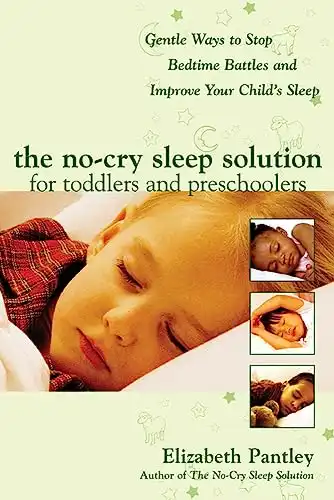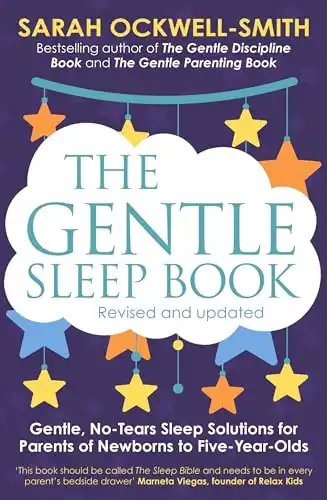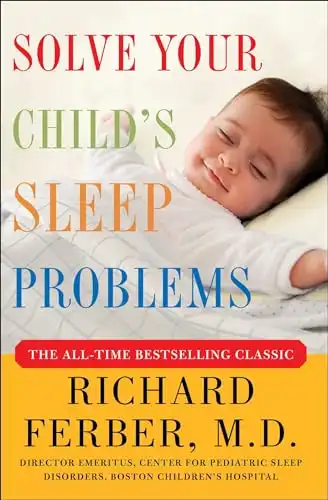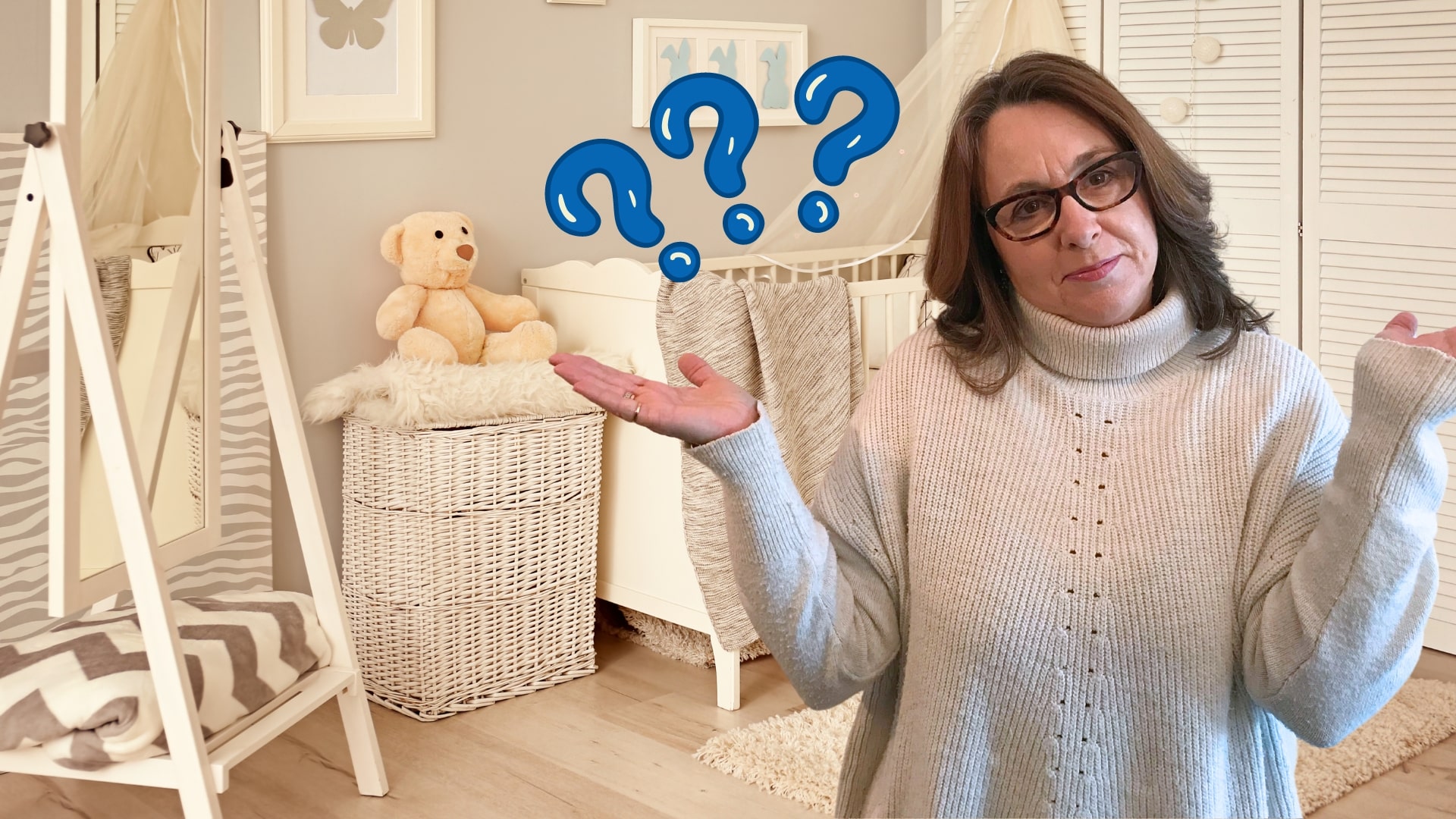Sleep training a 1-year-old involves teaching your child healthy sleep habits that will help them fall asleep on their own and stay asleep throughout the night.
However, sleep training can be a very divisive subject and is not for everyone…
The good news is that there is a lot more to sleep training a 1-year-old than letting your little one cry it out and the more informed you are the better. So let’s get into it!

Table of Contents
The Basics Of Sleep Training A 1-Year-Old
The basics of sleep training a 1-year-old begin by establishing an age-appropriate, consistent daily sleep schedule that allows baby to get about 12 hours of nighttime sleep and 1-2 daytime naps.
Followed by choosing a gradual training method such as the Ferber Method or the Chair Method to implement after a predictable, calming bedtime routine.
Nighttime wakings should be handled in the same manner and you should avoid giving into bad habits as this will undo your progress when sleep training a 1-year-old.
These techniques will encourage your baby to learn how to self-soothe and help them understand that it’s ok to be alone during sleep time.
There are, however, some tips you can follow that mean you may not have to sleep train your 1-year-old at all…
Sleep Training Tips: Before You Begin
Before beginning sleep training for your 1-year-old, it is important to prepare for the process.
Ideally, all of the following tips should be in place BEFORE you decide to sleep train your little one:
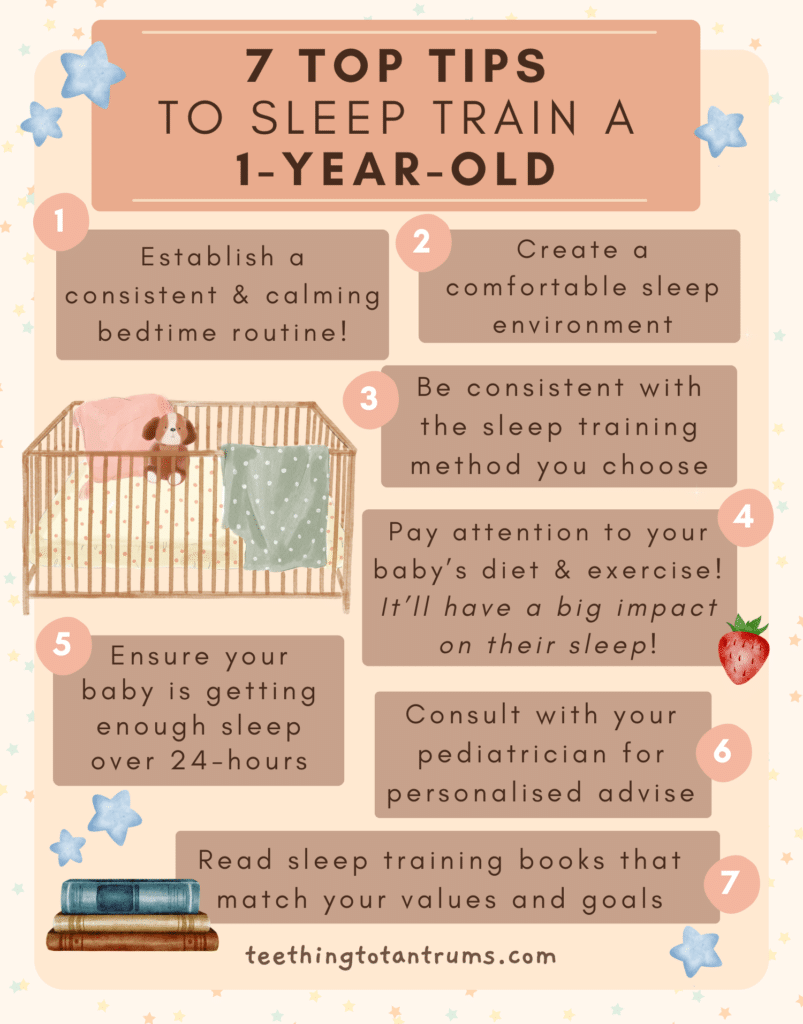
- Establish a consistent bedtime routine: A predictable bedtime routine can help your child feel secure and calm, making it easier for them to fall asleep. Include activities such as a warm bath, massage, reading a story, or singing a lullaby.
- Create a comfortable sleep environment: Make sure your child’s sleeping area is quiet, at the correct temperature, and dark or dimly lit. Use a night light and a white noise machine too. Soft sheets and comfortable sleepwear will also help your little one feel cozy and relaxed.
- Be consistent: Consistency is key when it comes to sleep training a 1-year-old. Stick to the same routine at the same time every night and avoid making exceptions, even on weekends.
- Pay attention to diet and exercise: A balanced diet and regular exercise can help regulate your child’s circadian rhythm and melatonin production, making it easier for them to fall asleep at night. Avoid sugary or caffeinated foods and drinks in the evening and make sure they have plenty to eat during the day so that hunger is not the cause of nighttime waking. Toddlers aged between 4 months – 3 years old need around 82 kcal/kg/day.
- Ensure your baby is getting enough age-appropriate daytime sleep: Overtiredness at bedtime will sabotage any sleep training you attempt. You can never look at nighttime sleep in isolation so getting daytime sleep right will positively impact bedtime. To know how much sleep your little one needs, read this post from the Sleep Foundation.
- Consult with your pediatrician: Before starting any sleep training program, consider discussing your child’s sleep habits with their pediatrician or talk to a pediatric sleep consultant.
- Read some baby sleep training books: Be informed and pick books that resonate with you the most. Do not embark on a sleep training method that makes you feel uncomfortable or causes you and your little one any stress. (I have listed my favorite books for sleep training a 1-year-old in the next section).
By taking these steps, you can help set your child up for success when it comes to sleep training. As I said you may find that by doing the above… conventional sleep training may not be necessary.
Choosing The Right Sleep Training Method For You
When it comes to sleep training a 1-year-old, there are many methods to choose from… Therefore, it’s important to find the right one for both you and your child.
The American Academy of Pediatrics recommends gentler sleep training methods that involve soothing your child and responding to their needs.
These methods include the chair method, where you sit next to your child’s crib until they fall asleep, and the fading method, where you gradually reduce your presence in the room over time.
I prefer these gentle methods for young babies too, but if you prefer a more structured approach, you may want to consider the Ferber method, the Graduated Extinction method, or the I’ll Be Back Method.
These techniques involve leaving your child for short periods and gradually increasing the length of time you are away.
NOTE: I believe the Cry It Out Method is not suitable for 1 year olds. However, the right sleep training method for you aligns with your parenting style and values, while also being effective for your child. And if the Cry-It-Out method works for you, then go for it.
How To Sleep Train A 1-Year-Old (My Preferred Method)
Sleep training a 1-year-old can be a challenge, but it is possible to establish healthy sleep habits with consistency and patience.
Here are some steps you can take to help your little one sleep through the night that I have used time and time again with great success:
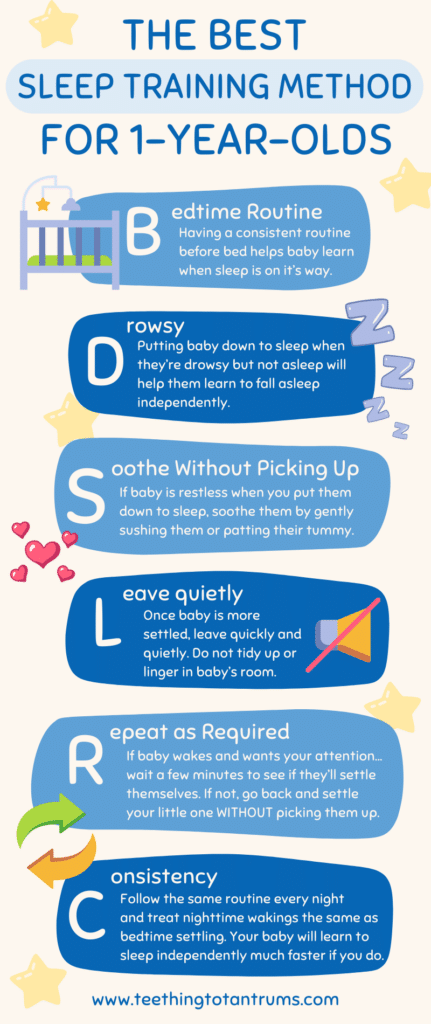
- Establish a consistent bedtime routine: As already stated one of the most important things is to establish a consistent bedtime routine that can help your child wind down and prepare for sleep.
- Encourage self-soothing: Encourage your child to self-soothe by putting them to bed drowsy but awake. This can help them learn to fall asleep on their own.
- If your baby fusses but is not crying… leave them alone for a while as many 12-month-olds will fuss for a while before they fall asleep. If they do start to cry, go in and gently put your hand on them, shush them, and maybe pat their tummy for a short time but do not pick them up.
- Once your baby is calm, leave the room. Repeat this as many times as necessary until they fall asleep. The most important thing is that you do not pick your child up.
- Handle night wakings appropriately: If your child wakes up at night, wait five minutes to see if they fall back asleep on their own before intervening. If they need your help, keep interaction minimal and avoid turning on bright lights or picking them up. Follow the same sleep training process as above.
- Gradually reduce nighttime feedings: If your child is still waking up for feedings, gradually reduce the amount of milk or formula they receive at night. This can help them learn to sleep through the night without a bottle.
- Keep track of daytime sleep: Ensure your little one is getting the right amount of age-appropriate daytime sleep. An overtired 12-month-old will struggle to fall asleep and stay asleep at bedtime. For an idea of what your little one’s sleep schedule should look like, read this post: The Perfect 12-Month-Old Sleep Schedule.
- Be consistent: Consistency is key when it comes to sleep training a 1-year-old and I cannot stress this enough. Stick to your routine even at the weekend and be patient as your child learns to adjust. The more consistent you are now, the quicker your 1-year-old will learn how to sleep independently.
- Over several nights you should find that your baby takes less and less time to fall asleep and you will have to make fewer visits. Eventually, they will fall asleep alone.
Further Reading:
To learn more about some of the techniques outlined above, read my posts about the following:
NOTE: It may take some trial and error to find the method that works best, but with patience and consistency, you can help your child develop healthy sleep habits.
Looking to get your little one to sleep quickly and effortlessly? Check out my Bedtime and Nap Cheat Sheet and master the art of making daytime naps and bedtimes as seamless as possible.
A bedtime & nap cheat sheet so good your little one will ask you to put them to bed...
Laura Williams "This is a life saver! I'm so glad I downloaded your bedtime & nap cheat sheet. My little one actually asked me to put him to bed last night! Unbelievable! Thank you so much!"
Click Here For The FREE Cheat Sheet
Addressing Sleep Training Challenges and Setbacks
Sleep training a one-year-old can be challenging, and sleep problems and setbacks are common.
If your child is sick or ill, teething or you are attempting to night wean, it’s best to delay sleep training until they are feeling better. Your little one will likely be waking more than usual anyway… and when they’re feeling unwell, they need more attention, love, and comfort.
Stress and behavioral problems can also make sleep training a 1-year-old more difficult, so it’s essential to address these issues before starting the process. Triggers can include moving house, the arrival of a sibling, or a parent returning to work.
If your little one is going through a nap transition you will find sleep training extra challenging. In this circumstance, be patient and consistent with your methods, and try not to give in to delaying tactics or rocking or holding your child to sleep. If you need to pause the sleep training, then do so.
And finally, prepare yourself to handle sleep regressions. They can occur at any time and are the enemy of your hard work. To learn more about sleep regressions when baby is 12 months old, read this post: Handling 12-Month Sleep Regression Like A Expert
Whilst this all sounds like a lot… remember that setbacks are normal and can occur at any time.
If your child is struggling with sleep, take a step back and reassess your sleep training methods. You may need to take a break from sleep training for a short while or you may need to try a different method.

Sleep Training Book Recommendations
Having researched sleep training extensively and specializing in sleep issues as a Norland Nanny, here is a comprehensive list of what I consider to be the must-read toddler sleep training books on the market.
They are all ideal for sleep training a 12-month-old, so take a look and see which fits your sleep training requirements.
1. No-Cry Sleep Solution for Toddlers by Elizabeth Pantley and Harvey Karp
Unlike many sleep training books, the No Cry Sleep Solution is specifically designed to help parents who are battling with toddler sleep and offers a lot more than just sleep training a 1-year-old for bedtime.
Elizabeth Pantley tackles all manner of sleep issues such as naptime problems, special sleep issues for twins, repeated nighttime visits to parents’ beds and so much more.
If you are looking for a book that tries to look at toddler sleep issues from all angles then this is the one for you. You should also bear in mind that Elizabeth’s approach is gentle and child-centred so there will be no ‘crying it out’ in her solutions.
Gently guiding your toddler to better sleep becomes less of a battle with this book. The No-Cry Sleep Solution aims to provide you with researched, kind methods that respect your child's needs.
Implementing the tips provided feels relevant and doable, as each chapter follows through with advice matched to common situations.
What's truly beneficial is the understanding of sleep you gain. It's a relief to have your experiences validated and then addressed, flipping the script on bedtime struggles.
You're not just reading; you're learning and applying new strategies each night.
- Endorsed by many parents over the last 18 years for its effectiveness
- Focused on gentle techniques
- Includes valuable research insights
- Offers specific advice for 1-5 year olds
- Follows a gentle child-centred approach
- Covers a variety of bedtime issues such as night wakings and getting your toddler to stay in bed
- May not work for every child
- Some information might overlap with books you've previously read
- The solutions require patience and time
2. The Gentle Sleep Book by Sarah Ockwell-Smith
The Gentle Sleep Book covers a wide range of ages from 0-5 years but I have included it in my list as I know from personal experience many parents who have used it and found it invaluable and refer to it as their ‘Sleep Bible’.
I believe this book is ideal for parents who are more relaxed about toddler sleep training but still want to raise a child with healthy sleep habits.
Sarah Ockwell Smith provides a holistic insight into childhood sleep in this book. She explains that very often our expectations are way too high when we expect our little ones to sleep through the night and that we aim for this perfection when they are not developmentally programmed to do so.
In a lot of ways, this is a book that makes parents who are battling with sleep issues feel ‘OK’ with what they are doing whether that be co-sleeping or nursing to sleep.
If you are happy to take this more relaxed approach to sleep training then this is probably the book for you.
- Offers a gentle approach to sleep training
- Offers reliable evidence-based advice
- Deals with night wakings as well as bedtime issues
- Offers advice for each developmental stage
- Covers how to deal with daytime nap issues too
- Mentions that bed sharing is OK... which is not for everyone
- The solutions take time... however, there's never a quick fix
- May be considered more of a parent self-help book than a sleep training book
3. Solve Your Child’s Sleep Problems by Richard Ferber
The sleep training classic, Solve Your Child’s Sleep Problems, has been revised and updated to deal with bedtime battles, nighttime waking, sleep terrors, and bedwetting in our modern world.
Though the book is vast, it’s a well of wisdom and you will find it addresses situations many other books do not.
Patience is key when implementing the techniques laid out, but persistence transforms nights from waking nightmares into peaceful slumber.
If you think Dr Ferber’s methods are all about letting your little one cry it out, think again. This book has so much more to offer and can give you valuable insight into childhood sleep. (It’s actually what I have based my tried and tested toddler sleep training method on)
Where To Buy Sleep Training Books
There are endless places to buy sleep training books. Amazon is the first place most people think of when looking for books…
However, you can try looking for free books (or for a significantly reduced price) at garage sales, libraries, charity shops, and online second-hand book shops such as Awesome Books and Better World Books.
Your friends and family may even have a copy you can borrow, so ask around!
Will Sleep Training Harm A 1-Year-Old?
Contrary to some concerns, sleep training done properly does not harm children. Research shows it can actually benefit both parents and babies.
A study by the American Academy of Pediatrics divided infants into two groups – one went through sleep training, the other did not. They measured the babies’ cortisol stress levels, parental satisfaction, parental stress, and the children’s attachment styles at one year old.
Results found that babies who were sleep trained had decreased cortisol by the end of the training, indicating lower stress.
And at one year old, there was no difference in attachment style or behavior between the groups.
So with the right methods and environment, sleep training helps babies learn to self-soothe without negatively impacting development.
Frequently Asked Questions About Sleep Training A 1-Year-Old
Looking for more information about sleep training a 1-year-old? Here the the most frequently asked questions answered just for you.
Q: How can I effectively manage night wakings with my 1-year-old during sleep training?
A: During sleep training, you can manage night wakings by using a consistent bedtime routine, setting clear sleep boundaries, and gradually reducing the amount of time you spend comforting your child during the night.
Encouraging your little one to self-soothe is also key to dealing with night waking. Using a night light and white noise machine can also help with your little learning to go back to sleep without your help.
Q: Can you sleep train a co-sleeping 1-year-old, and if so, how?
A: Yes, you can sleep train a co-sleeping 1-year-old by gradually transitioning your child to their bed. You can start by placing a crib or a mattress next to your bed and gradually moving it further away until your child is sleeping in their own room. You can also let baby nap in their own room as a stepping stone to sleeping independently.
Q: What are the recommended NHS guidelines for sleep training a 1-year-old?
A: The NHS does not have specific guidelines for sleep training a 1-year-old. However, they recommend establishing a consistent bedtime routine, creating a sleep-conducive environment, and avoiding stimulating activities before bedtime.
Q: Is the ‘cry it out’ method suitable for a 12-month-old, and for how long should it be applied?
A: The ‘cry it out’ method may be suitable for a 12-month-old, but it’s important to use it in moderation. You should start by letting your child cry for short periods and gradually increasing the duration.
However, it’s important to remember that every child is different, and the ‘cry it out’ method may not work for your child. To learn more about the cry-it-out method for a baby aged 12 months old, read this post: The Truth About The Cry It Out Method.
Q: Are there gentle sleep training alternatives that minimize crying for a 1-year-old?
A: Yes, there are gentle sleep training alternatives that minimize crying for a 1-year-old, such as the pick-up-put-down method, the fading method, and the no-tears method.
These gentler methods involve gradually reducing the amount of time you spend comforting or staying with your child to settle them at bedtime or during the night and can be very effective.
Need More Parenting Help?
- Download our FREE Perfect Sleep Cheat Sheet. It’s a free, easy-to-use and proven formula designed for parents of 0-5 year olds to master the art of consistently undisturbed and restful sleep without the yelling, nagging or exhausting long-winded evenings.
- Check out our Parenting Toolbox. You’ll get access to expertly-chosen products that you can guarantee are the best for your little one and your wallet.
- Ready to create the calm, peaceful evenings you deserve? Then checkout our most popular course - The Bedtime Battles Masterclass

A bedtime & nap cheat sheet so good your little one will ask you to put them to bed...
Laura Williams "This is a life saver! I'm so glad I downloaded your bedtime & nap cheat sheet. My little one actually asked me to put him to bed last night! Unbelievable! Thank you so much!"
Click Here For The FREE Cheat Sheet
